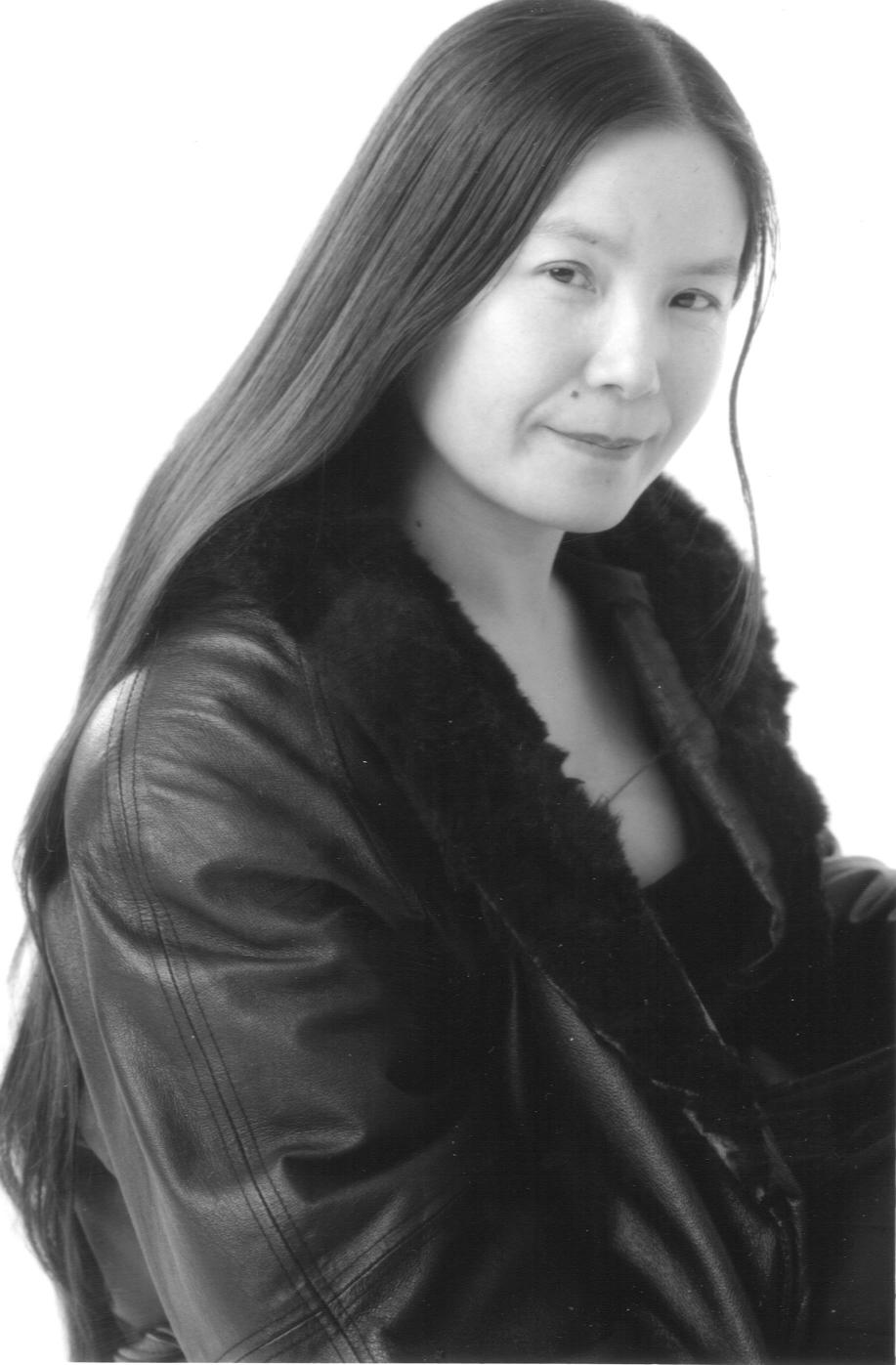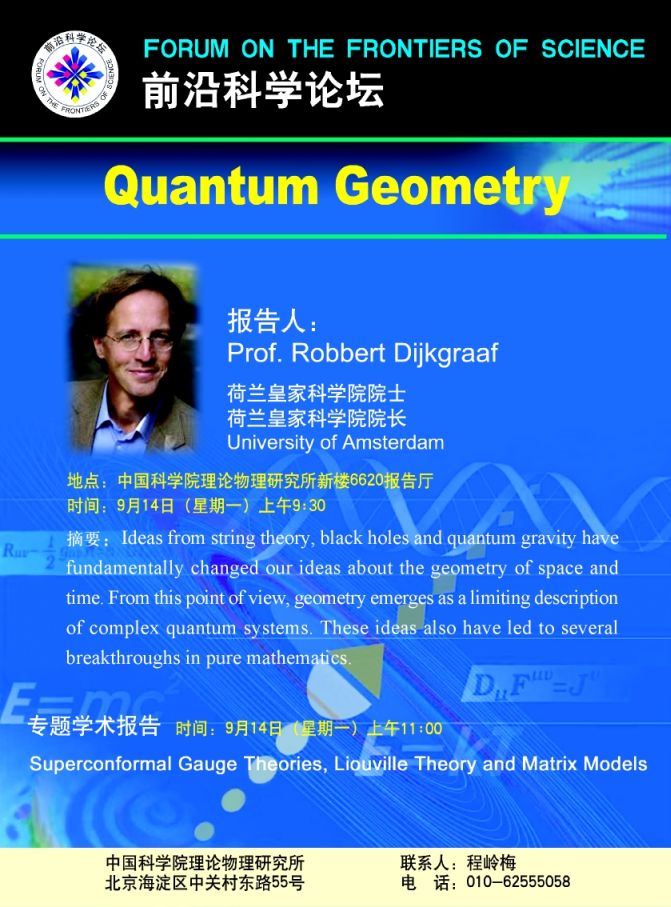王云是The University of Oklahoma的教授,宇宙学家,诗人。现在主要写英文诗。我从她的网站上拿来两首诗翻译一下,如果有误译,请王云指正。时间很短,中文没有仔细推敲。另外,荷兰科学院院长Robbert Dijkgraaf,一位弦论家,明天在理论物理所/卡弗里理论所做学术报告,报告广告附后。
关于头发的冥想
一群鱼进入暗黑的海湾
为脉动的蚕茧竞赛。精细缠绕
和旋动组成的实况剧本。
你思考箭头的起源。
陌生人的眼光流连于
你黑色瀑布的头发。
时间剥蚀你
带入风信子的包围。
一个封面接一个地阅读自己。
只有一条鱼幸存,被解密
形成一个新的宇宙。
而你的头发从未抵达足踝,
它们的长度不能超越一根
头发的寿命。你将茶叶排列成
天鹅座和猎户座的形状,
沐浴星光的树林中修长男人的梦
变形为飞行于液体天空中
闪着光芒的天鹅。
你是一间与居住者一同长大的房屋
在内部用拳脚敲击墙壁。
你是一间盛满虹彩般回音的房屋。
初生者在视界的边缘竖起鬃毛。
击鼓手在干燥轻快的
光的隧道中挤压而过。
时间浸蚀你。蜂鸟飞逝。
镜中的一丝白光:细针一样的白发。
头皮下的发根讨论着你的变化。
终于,你进入一湖靛蓝的星群
直到你的身体在化石中消融
头发仍然在地表下生长?叹息。
王云的注记:
还是一位小姑娘的时候我留着很长的头发,直到有一天我妈在我的头发中看到了虱子,将我的头发剪短。那时我和来自农村的姑娘一起玩,她们要劳动所以不常洗头,虱子被认为从她们那里传来的。我很喜欢这些玩伴,因为她们也喜欢我,尽管我喜欢读书。我羡慕她们能够留长发,不论是不是有虱子,而我却一定要将头发剪短。
在我去千里外的大学上学之后,那时我只有十六岁,我可以自己将头发留长了。不过过了一年后我才明白过来,那以后我再也没有剪短我的头发。
头发越长越长,一段时间后好像总是保持着同样的长度。有时,一些人请求摸摸我的头发祈福。更多的时候,她们想知道我留了多长时间的头发。我开始厌倦这些问题,不希望在我单独旅行的时候吸引陌生人的目光。这首诗就是为了回答她们问的一些问题的。同时,Li-Young Lee的第一部诗集《玫瑰》也触发了这首诗。
Meditation on Hair
A school of fish enters the dark cove
races for pulsing cocoons. Live scripts
of intricate twists and turns.
You ponder the origin of arrows.
Eyes of strangers swim
the dark waterfall of your hair.
Time erodes you
into the ambience of hyacinth.
You read yourself from cover to cover.
A single fish survives, decoded
to form a new universe.
Your hair never reaches your ankles,
its length cannot exceed the lifespan
of a single hair. You arrange tea leaves
into patterns of Cygnus and Orion,
dream of slender men in a starlit forest
metamorphosing into swans that glow
in flight into a liquid sky.
You are a room that grows with its occupant
tapping your insides with tiny feet and fists.
You are a room filled with iridescent echoes.
Nascent shoots bristle on the horizon.
The drummer squeezes through
the tunnel to dry, airy light.
Time erodes you. Hummingbirds flee.
A glistening in the mirror: needles of white hair.
The roots within your head discuss your change.
Finally, you enter a lake of indigo stars.
Your hair continues to grow beneath the earth
until your body dissolves in fossils. exhalations.
Wang comments on her poem:
I had long hair when I was a little girl, until my mother cut it very short when lice were found in it. The lice were blamed on the other girls I played with, who lived in the countryside and worked more and washed less than I did. I was very fond of these girls, because they liked me, in spite of my love of books. I was envious that they got to keep their hair long, lice or not, and I was forced to keep my hair very short.
When I went away to college, thousands of miles away, and at the age of sixteen, I finally got to choose my own hair length. This did not sink in for almost a year. After that, I never cut my hair.
My hair grew longer and longer, and then it seemed to have stayed more or less the same length. Sometimes, people asked my permission to touch my hair for good luck. Most of the time, people ask me how long I have been growing my hair. I got tired of this question, and the unwanted attention of strangers when I traveled alone. This poem was written to answer some of the questions I was asked. This poem was also triggered by a poem in Li-Young Lee抯 first poetry book, Rose.

解构马勒
古斯塔夫·马勒会去滑雪吗?
我能让我想象之猫不再
跟随用尼采的话逗弄我的
一位消瘦的陌生人吗?
水滴在空气中聚集
在适当的时候和适当的地点:
一道彩虹。
马勒变成天主教徒
就能指挥维也纳歌剧院
拥有卡林西亚湖边的大别墅。
希特勒知道他是犹太人吗?
骨灰如雪落在奥斯威辛。
水漫过地震:
一场海啸。
马勒第一个孩子没有活过五岁。
他的妻子与另一个男人调情时
他在创作最后一部
没有完成的交响乐。
海洋孕育。
海洋哭泣。
海洋承受。
海洋大笑。
有人穿上天蓝滑雪衫
在雪山下驾驶摩托
雪山如象。
我成为母亲。
海洋之上蓝色的闪光:
无名水滴的交响乐章。
暗蓝波涛中升起马勒。
第五交响曲将空气染成
深紫。
我想象之猫滑入空气。
Deconstructing Mahler
Would Gustav Mahler go skiing?
Would I stop my imaginary cat from following
a thin stranger who teased me
with quotations from Nietzsche?
Water drops gather in the air
at the right place and right time:
a rainbow.
Mahler became a Catholic
so that he could direct the Vienna Opera
own a grand villa by the lake in Carinthia.
Did Hitler know that Mahler was a Jew?
Ashes snowed over Auschwitz.
Water covered earthquake:
a tsunami.
Mahler’s first born died at age five.
He composed his last
unfinished symphony
while his wife dallied with another man.
The ocean gives life.
The ocean cries.
The ocean absorbs.
The ocean laughs.
Someone dons a sky blue ski suit
rides his motorcycle against snow mountains
white as elephants.
I enter motherhood.
Green flash over the ocean:
a symphony of anonymous water drops.
Mahler rises out of dark blue waves.
His fifth symphony tinges the air with
deep purple.
My imaginary cat glides into the air.
Yun Wang’s first poetry book, titled “The Book of Jade,” won the NicholasRoerich Poetry Prize from Story Line Press and was published in 2002. Her poetry chap book, titled “The Carp,” was published by Bull Thistle Press in 1994. She has published poems in numerous literary journals, including the Kenyon Review, Green Mountains Review, InternationalQuarterly, Poet Lore, and many others.

Robbert Dijkgraaf (born 1960) has been a “Distinguished University Professor” at the University of Amsterdam since 2005, where he has held the chair of mathematical physics since 1992. Prof. Dijkgraaf studied physics and mathematics at Utrecht University. After an interlude studying painting at Amsterdam’s Gerrit Rietveld Academy, he gained his PhD cum laude in Utrecht in 1989. His supervisor was the Nobel Prize-winner Gerard ‘t Hooft. Prof. Dijkgraaf subsequently held positions at Princeton University and at Princeton’s Institute for Advanced Study.
His current focus is on string theory, quantum gravity, and the interface between mathematics and particle physics. His research was recognised in 2003 with the award of the NWO Spinoza Prize, the highest scientific award in the Netherlands. Robbert Dijkgraaf has been a guest professor at universities including Harvard, MIT, Berkeley, and Kyoto. He is on the editorial boards of numerous scientific periodicals, and is also the scientific adviser to institutes in Cambridge, Bonn, Stanford, Dublin, and Paris.
Many of his activities are at the interface between science and society. His column in the NRC Handelsblad newspaper is intended for a broad public and deals with science, the arts, and other matters. Many of his articles are available in Blikwisselingen (published by Uitgeverij Bert Bakker, 2008). Prof. Dijkgraaf is dedicated to bringing about greater public awareness of science, for example through his involvement with a popular TV science programme. He also initiated (and finances) , a website that allows children (aged 8 and up) to carry out simple experiments.
Prof. Dijkgraaf is also a member of the Second Innovatieplatform.
Robbert Dijkgraaf has this to say about the Academy: “The Royal Netherlands Academy of Arts and Sciences plays a special role in Dutch society. It provides a scientific forum and is the voice and the conscience of science, but it also represents its soul.”
0
推荐



 京公网安备 11010502034662号
京公网安备 11010502034662号 